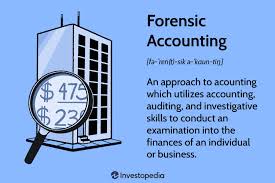Forensic Accounting: Uncovering the Truth Behind Financial Data
Forensic accounting is a specialized field that combines accounting, auditing, and investigative skills to examine financial records and uncover potential fraud or misconduct. It plays a crucial role in legal proceedings, regulatory investigations, and business disputes by providing objective analysis of financial data.
One of the key objectives of forensic accounting is to detect and prevent financial fraud. By meticulously examining financial transactions, documents, and records, forensic accountants can identify irregularities or discrepancies that may indicate fraudulent activities. They use various techniques such as data analysis, interviews, and background checks to gather evidence and build a case.
In addition to fraud detection, forensic accounting also involves quantifying economic damages in legal disputes. Forensic accountants assess the financial impact of disputes such as breach of contract, intellectual property infringement, or business interruption. Their expert analysis helps parties involved in legal proceedings reach fair settlements based on accurate financial information.
Furthermore, forensic accountants play a vital role in corporate investigations and compliance efforts. They help businesses identify weaknesses in their internal controls, policies, and procedures that may leave them vulnerable to fraud or regulatory violations. By conducting thorough reviews of financial systems and practices, forensic accountants assist organisations in strengthening their risk management processes.
Overall, forensic accounting serves as a crucial tool in maintaining transparency and integrity in financial reporting. By uncovering the truth behind complex financial data, forensic accountants provide valuable insights that help stakeholders make informed decisions and uphold ethical standards in business practices.
Essential FAQs on Forensic Accounting: Qualifications, Certifications, Key Areas, and Roles Explained
- How to qualify as a forensic accountant?
- Do I need ACCA to be a forensic accountant?
- What are the three main areas of forensic accounting?
- What is the role of a forensic accountant?
How to qualify as a forensic accountant?
To qualify as a forensic accountant, individuals typically need a strong educational background in accounting or a related field, such as finance or business. Most aspiring forensic accountants pursue professional qualifications, such as becoming a Certified Public Accountant (CPA) or Chartered Accountant (CA), to demonstrate their expertise and credibility in the field. Additionally, gaining practical experience in auditing, financial analysis, and investigative accounting is essential for developing the necessary skills to excel in forensic accounting. Continuous learning and staying updated on industry trends and regulations are also crucial for aspiring forensic accountants to build a successful career in this specialised and challenging field.
Do I need ACCA to be a forensic accountant?
To become a forensic accountant, having an ACCA (Association of Chartered Certified Accountants) qualification can be beneficial but is not always a strict requirement. While ACCA certification demonstrates a strong foundation in accounting principles and practices, becoming a forensic accountant typically involves acquiring additional skills in areas such as investigation, auditing, and legal procedures. Many forensic accountants hold ACCA qualifications alongside specialised certifications in forensic accounting or related fields to enhance their expertise in uncovering financial misconduct and providing expert analysis in legal matters. Ultimately, a combination of relevant qualifications, experience, and ongoing professional development is essential for success as a forensic accountant.
What are the three main areas of forensic accounting?
Forensic accounting encompasses three main areas of expertise: investigation, litigation support, and expert witness testimony. In the investigation aspect, forensic accountants delve into financial records to uncover potential fraud, embezzlement, or other financial irregularities. They use their analytical skills to trace transactions, identify discrepancies, and gather evidence for legal proceedings. In litigation support, forensic accountants assist legal teams by providing financial analysis and expert opinions in disputes such as contract breaches or shareholder disagreements. Finally, in expert witness testimony, forensic accountants present their findings in court as impartial experts, helping judges and juries understand complex financial matters and reach informed decisions based on solid evidence.
What is the role of a forensic accountant?
In the field of forensic accounting, the role of a forensic accountant is multifaceted and crucial. Forensic accountants are tasked with investigating financial records, transactions, and activities to uncover potential fraud, misconduct, or discrepancies. They play a key role in detecting and preventing financial fraud by applying their expertise in accounting, auditing, and investigative techniques to analyse complex financial data. Additionally, forensic accountants quantify economic damages in legal disputes and provide expert opinions in court proceedings. Their role extends to corporate investigations, compliance efforts, and risk management, where they help organisations strengthen their internal controls and mitigate financial risks. Overall, the role of a forensic accountant is to uphold transparency, integrity, and ethical standards in financial reporting through meticulous analysis and objective evaluation of financial information.

